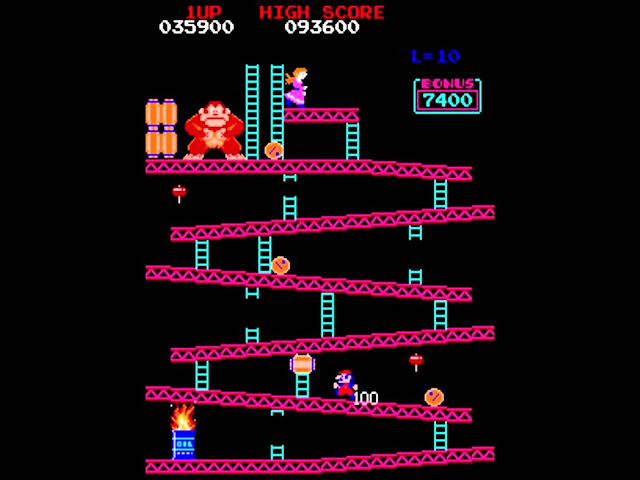Donkey Kong // Universal City Studios Vs. Nintendo
 |
| Gameplay screenshot for the arcade game Donkey Kong (1981) |
Donkey Kong is an arcade game released by Nintendo in 1981. An early example of the platform game genre, the gameplay focuses on maneuvering the main character across a series of platforms while dodging and jumping over obstacles. In the game, Mario (originally named Mr. Video and then Jumpman) must rescue named Pauline (originally named Lady), from a giant ape named Donkey Kong. The hero and ape later became two of Nintendo's most popular and recognizable characters. Donkey Kong is one of the most important games from the golden age of arcade video games as well as one of the most popular arcade games of all time.
Universal Studios filed a lawsuit against Nintendo for copyright infringement in 1982, claiming video game creator Shigeru Miyamoto had based Donkey Kong’s story and characters on King Kong, the movie studio’s intellectual property. Nintendo fought the lawsuit and claimed that King Kong was in the public domain after it was revealed that Universal sued RKO—the movie studio that made the original 1933 film—over King Kong’s film rights. At the time, Universal also claimed that King Kong was in the public domain when they made the remake in 1976.
Facts:
During trial, the judge actually had to play Donkey Kong and watch King Kong movies to determine if there were similarities between the two. The Judge concluded that “the differences between them were great”, that the Donkey Kong game was “comical” and the Donkey Kong gorilla character was “farcical, childlike and nonsexual.” In contrast, the court described the King Kong character and story as “a ferocious gorilla in quest of a beautiful woman.” In summary, the court concluded that “Donkey Kong creates a totally different concept and feel from the drama of King Kong” and that at best, Donkey Kong was a parody of King Kong. If a mark is a parody of another mark, it is an exception to trademark infringement.
But even more important than these conclusions from the judge, Nintendo discovered that Universal did not actually own King Kong because it didn’t really have any ownership over it. Nintendo also found out that Universal previously won another court case proving that King Kong was in public domain, which allowed Universal to use King Kong in its 1970s movie remake of the same name. This discovery along with the other arguments and conclusions by the Court made the case for Nintendo. Universal appealed their case up to the U.S Supreme Court seeking to overturn the trial court’s decision in favor of Nintendo, but was ultimately an exercise in futility. Nintendo was adjudged the winner of the case and was awarded an amount of $1.8 Million dollars.



Comments
Post a Comment